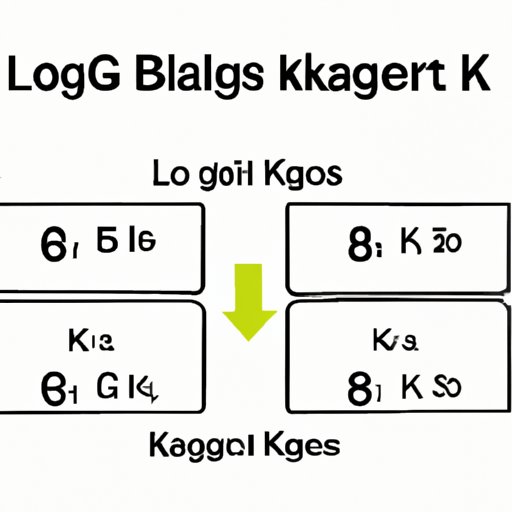
I. Introduction
Converting pounds (lbs) to kilograms (kgs) can be a bit confusing if you’re not familiar with the process. However, knowing how to convert these units of measurement can be very useful in many situations, such as when weighing oneself, cooking, or tracking weight loss progress.
In this article, we’ll provide a step-by-step guide with tips and tools to help you convert lbs to kgs quickly and easily.
II. Background Information
Lbs and kgs are both units of weight or mass, but they are used in different parts of the world. The pound is commonly used in the United States, while the kilogram is the standard unit of measurement in most other countries.
The pound is a smaller unit than the kilogram, and 1 pound is equal to 0.453592 kilograms.
Knowing how to convert lbs to kgs is important if you need to communicate your weight or the weight of an object with someone who uses the metric system.
III. Step-by-Step Guide
The formula for converting lbs to kgs is quite simple: divide the weight in pounds by 2.2046.
Here’s a step-by-step guide on how to convert lbs to kgs:
Example 1: Converting a Small Weight (e.g. 50 lbs)
- Take the weight in pounds (50 lbs).
- Divide it by 2.2046 (50 / 2.2046 = 22.68).
- The weight in kgs is 22.68.
Example 2: Converting a Larger Weight (e.g. 150 lbs)
- Take the weight in pounds (150 lbs).
- Divide it by 2.2046 (150 / 2.2046 = 68.04).
- The weight in kgs is 68.04.
It’s important to note that the result is not always a whole number, and rounding may need to be applied depending on the level of precision required.
Here are some tips for making the conversion process smoother:
- If using a calculator, enter the formula correctly and use parentheses to ensure the correct order of operations.
- Check for accuracy by converting the weight back to pounds and confirming that it matches the original weight.
- Round up or down when necessary based on the desired level of precision.
IV. Infographic
Visual aids can be very helpful for understanding and remembering the conversion process. Here’s an infographic that illustrates the conversion formula:

Here are some tips for how to convert common weights:
| Pounds | Kilograms |
|---|---|
| 50 lbs | 22.68 kgs |
| 100 lbs | 45.36 kgs |
| 150 lbs | 68.04 kgs |
| 200 lbs | 90.72 kgs |
| 250 lbs | 113.4 kgs |
V. Conversion Tool Review
There are many online tools available for converting lbs to kgs. Here are some of the most popular ones:
- Metric-Conversions.org: This tool is simple and easy to use, with options to round up or down and to calculate multiple conversions at once.
- UnitConverters.net: This tool is also user-friendly and offers options to customize the rounding and precision of the result.
- CalculateMe.com: This tool provides additional information about the conversion, such as the number of ounces in the original weight.
Each tool has its pros and cons. For example, some tools may offer more customizable options than others, while some may provide additional information about the conversion process. Ultimately, the most useful tool depends on the user’s specific needs and preferences.
VI. Case Study
Consider the case of John, who recently moved from the United States to a country that uses the metric system. John wanted to weigh himself using a scale that only showed his weight in pounds.
Here’s how John could convert his weight to kilograms:
- Step on the scale and read his weight in pounds (180 lbs).
- Divide his weight by 2.2046 (180 / 2.2046 = 81.65).
- John’s weight in kgs is 81.65.
John was pleased to learn how to convert his weight to the metric system, and he found that it made it easier to communicate with his new friends and colleagues.
VII. FAQ
Here are some common questions that people have about converting lbs to kgs:
Q. Is it possible to convert kgs to lbs?
A. Yes, the formula for converting kgs to lbs is: multiply the weight in kilograms by 2.2046.
Q. Should I round up or down when converting lbs to kgs?
A. It depends on the level of precision required. If you need an exact conversion, do not round. Otherwise, round up or down based on the desired level of precision.
Q. How can I convert odd or irregular weights?
A. Use a scale to measure the weight as precisely as possible, then use the formula for converting lbs to kgs.
Q. Why is it important to know how to convert lbs to kgs?
A. Knowing how to convert lbs to kgs is important for communicating weight or mass accurately with people who use the metric system. It can also be useful in everyday situations such as cooking, tracking weight loss progress, and shipping packages internationally.
VIII. Conclusion
Converting lbs to kgs is a simple and useful skill that can come in handy in many situations. By following the step-by-step guide, using the infographic and tips, and exploring various conversion tools, anyone can quickly and easily convert pounds to kilograms.




